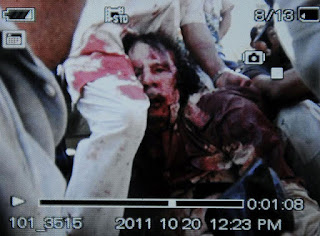Muammar Muhammad Abu Minyar al-Gaddafi, commonly known as Muammar Gaddafi or Colonel Gaddafi, was the autocratic ruler of Libya from 1969, when he seized power in a bloodless military coup, until 2011 when his government was overthrown in a civil war which consisted of a popular uprising aided by a foreign intervention. His 42-year rule prior to the uprising made him the fourth longest-ruling non-royal leader since 1900, as well as the longest-ruling Arab leader.He variously styled himself as "the Brother Leader" and "Guide of the Revolution"; in 2008 a meeting of traditional African rulers bestowed on him the title "King of Kings".
After seizing power in 1969, he abolished the Libyan Constitution of 1951 and civil liberties enshrined in it. He imposed laws based on the political ideology he had formulated, called the Third International Theory and published in The Green Book. Rising oil prices and extraction in Libya led to increasing revenues. By exporting as much oil per capita as Saudi Arabia, Libya achieved the highest living standards in Africa. However, at the same time similarly oil-rich Gulf countries improved their living standards much further, and this fact was visible to ordinary Libyans. Early during his regime, Gaddafi and his relatives took over much of the economy. Gaddafi started several wars and acquired chemical weapons. The United Nations called Libya under Gaddafi a pariah state. In the 1980s, countries around the world imposed sanctions against Gaddafi. Six days after the capture of Iraqi dictator Saddam Hussein by United States troops, Gaddafi renounced Tripoli's weapons of mass destruction (WMD) programs and welcomed international inspections to verify that he would follow through on the commitment. A leading advocate for a United States of Africa, he served as Chairperson of the African Union (AU) from 2 February 2009 to 31 January 2010.
In February 2011, following revolutions in neighbouring Egypt and Tunisia, protests against Gaddafi's rule began. These escalated into an uprising that spread across the country, with the forces opposing Gaddafi establishing a government based in Benghazi named the National Transitional Council (NTC). This led to the 2011 Libyan Civil War, which included a military intervention by a NATO-led coalition to enforce a UN Security Council Resolution 1973 calling for a no-fly zone and protection of civilians in Libya. The assets of Gaddafi and his family were frozen, and both Interpol and the International Criminal Court issued arrest warrants on 27 June for Gaddafi, his son Saif al-Islam, and his brother-in-law Abdullah al-Senussi, concerning crimes against humanity. Gaddafi and his forces lost the Battle of Tripoli in August, and on 16 September 2011 the NTC took Libya's seat at the UN, replacing Gaddafi. Gaddafi retained control over parts of Libya, most notably the city of Sirte, to which it was presumed that he had fled. Although Gaddafi's forces initially held out against the NTC's advances, Gaddafi was captured as Sirte fell to the rebel forces on 20 October 2011, and shot dead soon after.
The golden pistol of Muammar Gaddafi
VIDEO





No comments:
Post a Comment